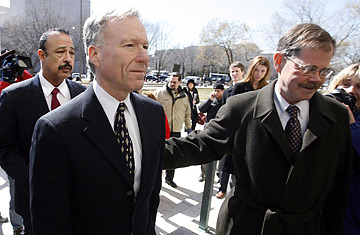
Former Cheney aide Lewis "Scooter" Libby (C) exits the U.S. Federal Courthouse with his attorneys William Jeffress Jr., (R) and Theodore B. Wells (L) after he was convicted of four federal crimes at the U.S. Federal Courthouse in Washington, March 6, 2007.
On June 5, Libby will be sentenced by Judge Reggie Walton. While Libby could face up to three years in federal prison, the judge has discretion over the sentence, and Libby's lack of a previous criminal record will stand him in some favor. Before the sentencing, Libby's lawyers will argue for a new trial, though that is something Walton is unlikely to grant. Libby's lawyers next move would be to ask Walton to postpone the sentencing until an appeal can be heard. Such an appeal could be considered and ruled on in as little as six months, according to retired Federal Judge Stanley Sporkin, but could stretch into 2008 if the appeals briefs are extensive. And given the way Libby's lawyer Ted Wells tried to slow down the process with pre-trial motions last year, they are likely to be.
If his appeal fails, Libby's only recourse would be a presidential pardon. But will Bush do it? The Washington Post staff has already opened a pool to predict the pardon date. Democrats greeted the verdict with near-unanimous calls on Bush to forswear a pardon in the Libby case. To be sure, Bush has been more stingy about pardons than some recent Presidents. During his eight-year term, Bill Clinton issued 395 pardons and 61 commutations during his presidency. The first President Bush, by comparison, issued only 77 pardons during his four-year term. His son has thus far issued 113 pardons as President. But as governor of Texas, he holds the record for the least number of pardons of any Texas governor since the 1940s (only 17, compared with 70 for his predecessor Ann Richards). He has explained his reluctance by citing his bad experience with the case of a drug dealer he pardoned, who was rearrested a few months later for stealing cocaine from a drug raid.
The controversy over Clinton's large number of pardons at the end of his term may also give Bush pause. Among those forgiven by Clinton was Marc Rich, the fugitive millionaire wanted for tax evasion and illegal trading with Iran. Coincidentally, one of Rich's legal counsels in the 1980s was Scooter Libby.
Yet Bush may have an incentive to at least keep the door open to a possible pardon, rather than foreclosing it now, as Democrats insist. In his first comments after the verdict, Special Counsel Patrick Fitzgerald hinted that he might argue for leniency in Libby's sentencing if Dick Cheney's former aide decided to cooperate with the government now that he's been convicted. "Mr. Libby is like any other defendant. If his counsel or he wish to pursue any options, they can contact us," said Fitzgerald. Without the possibility of a Presidential pardon, Libby would presumably have more incentive to strike a deal. And since Fitzgerald would clearly be seeking more information about the role of other Administration figures, including Vice President Cheney, it might not be something Bush would want to encourage.
